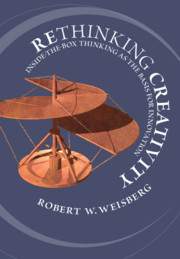Book contents
- Rethinking Creativity
- Rethinking Creativity
- Copyright page
- Dedication
- Contents
- Figures
- Tables
- Part I Introduction
- Part II Analytic Thinking in Creativity
- Part III The Question of Extraordinary Thought Processes in Creativity
- 6 How Do You Get to Carnegie Hall? Practice, Talent, and Creativity
- 7 Insight in Problem-Solving and Creative Thinking
- 8 The Question of Unconscious Processes in Creative Thinking
- 9 Genius and Madness
- Part IV The Psychometrics of Creativity
- Part V The Neuroscience of Creativity
- References
- Index
7 - Insight in Problem-Solving and Creative Thinking
from Part III - The Question of Extraordinary Thought Processes in Creativity
Published online by Cambridge University Press: 01 October 2020
- Rethinking Creativity
- Rethinking Creativity
- Copyright page
- Dedication
- Contents
- Figures
- Tables
- Part I Introduction
- Part II Analytic Thinking in Creativity
- Part III The Question of Extraordinary Thought Processes in Creativity
- 6 How Do You Get to Carnegie Hall? Practice, Talent, and Creativity
- 7 Insight in Problem-Solving and Creative Thinking
- 8 The Question of Unconscious Processes in Creative Thinking
- 9 Genius and Madness
- Part IV The Psychometrics of Creativity
- Part V The Neuroscience of Creativity
- References
- Index
Summary
This chapter examines the phenomenon of insight in problem-solving, a challenge to the analytic-thinking view concerning creativity. “Insight” refers to the idea that creative ideas come about suddenly, as the result of far-ranging creative leaps, in which thinking breaks away from what we know and moves far into the unknown. Leaps of insight are sometimes called Aha! or Eureka! experiences. If creative thinking is based on leaps of insight, then analytic thinking is irrelevant to creativity. We first examine several additional examples of creative advances that have been analyzed as being brought about by leaps of insight. The chapter then reviews the history of research and theory concerning insight, which was introduced more than 100 years ago into psychology by the Gestalt psychologists. In the early 1980s, there was an upsurge of research and theorizing concerning insight that has continued to today. That research has brought deeper understanding into the processes underlying insight. The chapter concludes with an analysis of insight in terms of analytic thinking.
Keywords
- Type
- Chapter
- Information
- Rethinking CreativityInside-the-Box Thinking as the Basis for Innovation, pp. 215 - 248Publisher: Cambridge University PressPrint publication year: 2020

